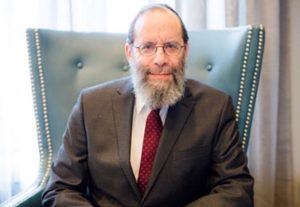This column was written by a group of Jewish community professional and volunteer advocates who worked closely with and were inspired by Paul Michaels.
On July 23, Paul Michaels suddenly passed away. Long-time CJN readers will remember Paul from his prolific columns over the years, which provided valuable insights into Israel and the region. However, many would not know the man behind the ink—nor the indelible impact he made on the world of Jewish and Israel advocacy, and those individuals within it.
In the summer of 1987, Paul left his job at Xerox to take a position in media relations at the Canada-Israel Committee. Within a few months, the First Intifada erupted, and media hostility toward the Jewish state intensified. Paul had found his calling. He rose to the challenge then as he would consistently do over the next 34 years of service to our community, including with UJA’s advocacy agent the Centre for Israel and Jewish Affairs (CIJA), as well as B’nai Brith Canada.
During his time in the community, Israeli history would unfold in unpredictable directions. From peace accords to terror attacks, from the start-up nation boom to repeated military operations, our community watched and responded to the best of our ability.
At every turn, Paul was there to fight for the truth. While “fight” doesn’t seem like the right term for such a gentle and thoughtful soul, that is exactly what he did every day with his characteristic composure, integrity, and encyclopedic knowledge.
Whether working the phones from his office in Toronto or leading Canadian journalists on missions to Israel, Paul challenged those who shape the news to adhere to objective truth. He called out lazy thinking, bias, and cynicism toward Israel that has far too often marked media coverage of the conflict.
He consistently rooted his arguments in the facts, and in this regard, Paul was unmatched in his command of the history and nuances of the Arab-Israeli conflict. His Zionist convictions were clear and principled, as was his rejection of the extreme left and extreme right alike. He compellingly reminded Canadians that, whatever criticisms one may have of Israeli policies, an objective assessment would conclude that the core of the conflict has never been Israel’s actions, but the violent rejection of the Jewish state’s existence by its neighbours.
So too, Paul grew in his conviction that Judaism and Zionism were intertwined, recognizing that one’s connection to Israel deepened as one’s Jewish knowledge expanded. While Paul did not consider himself religiously observant, his insatiable thirst for knowledge led him on an intellectual journey into the great world of Jewish thought—as it did on so many other topics. His scholarship further grew, as did his tremendous appreciation for the ideas and ideals that define us as Jews.
In Pirkei Avot (The Ethics of the Fathers), we are taught: “In a place where there are no men, strive to be a man.” In every place he went, Paul was more than a man—he was a mensch. As tributes come pouring in with the news of his untimely passing, everyone else seems to be using that same word to describe him. Universally, Paul was recognized as the quintessential gentleman.
As former colleagues who worked closely with Paul, either as professionals or volunteers, we are immensely grateful for his friendship and mentorship. He touched our lives and shaped who we are as Jewish community advocates, not only through his model of excellence in advocacy, but also in the extraordinary quality of his moral character.
We can recount times when we reached out to Paul for advice on a project or challenge. He was our first choice as a fact-checker, because we knew he was never wrong about the facts. If he was uncertain, he would know exactly where to find it in his library, with his signature margin notes carefully recorded. He always seemed to have the right instincts, an original take, and an intellectually honest approach.
His kind eyes shone when he spoke about the potential of Israel and the Jewish community. Though his knowledge was arguably unparalleled in our community, he approached every question and task with humility. Just as he always searched for answers, he always found an opportunity to help his friends and colleagues along the way. After a conversation with Paul, we each emerged smarter, more thoughtful, and appreciative for having the counsel of a man like him at our disposal.
We like to imagine that, up in the Heavens, Paul is surrounded by a beautiful library and classical music (with his beloved dog Max resting at his side). He is undoubtedly engaged in debate with the intellectual giants of the Jewish people and Western thought. While Paul would be too humble to think it, those giants would consider themselves in the company of an intellectual equal. And they would be right.
We write these words with grief and affection not only for Paul, but for his family. Paul’s love for his wife, Fran, and their two children, Samantha and Eric, made it clear that the special qualities he brought every day to the world of advocacy were the very same characteristics that defined his world at home.
May Paul’s family be comforted by good memories, and the knowledge that he touched the lives of many. May we all be inspired by Paul to see every challenge as an opportunity to serve great causes, as he did throughout his career. Yehi zichro baruch—may his memory be blessed and be a blessing to others.







